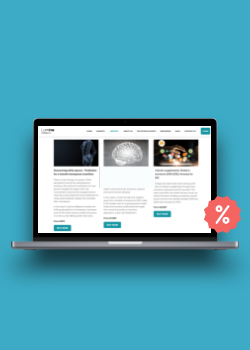Time for a smarter approach to adaptogens

Whilst consumer interest in botanical adoptogenic ingredients has taken off in recent years, innovations in this space have risked confusing consumers on the health benefits of the different ingredients in this space, according to Dr. Miguel Florido, Nektium’s Medical Affairs & Scientific Marketing Director.
He says that now is an important time for this category as consumers are just beginning to pay attention and this interest will only remain if they are educated correctly on the benefits of the ingredients, and if products actually provide their promised results.
As such, the team at the Spanish botanical supplier is working to review all the science in this space to provide a clearer understanding of the many different ingredients, their mechanisms of action, their labelling, and their potential uses.
Florido says his team suggests adaptogens should be considered in three categories: primary (or classical) adaptogens, secondary adaptogens and adaptogen companions.
“Primary adaptogens" include Panax ginseng, Rhodiola rosea, Panax quinquefolious, Aronia melanocarpa (black chokeberry), Withania somnifera (Ashwagandha), amongst others. He says these have a wealth of scientific studies confirming their adaptogenic character.
"Secondary adaptogens" share some of the characteristics or qualities of traditional adaptogen definitions, but do not meet all of the criteria of primary adaptogens and have not been extensively studied, such as: Bacopa monnieri, Panax notoginseng, Asparagus racemosus Willd., Phyllanthus emblica (emblic) and Glycyrrhiza glabra (liquorice).
Finally, "adaptogen companions", are characterised by enhancing the effect of primary or secondary adaptogens without direct modulation on the hypothalamic-pituitary-adrenal axis, and typically are rich in flavonoid-type nutraceutical polyphenols. Some relevant botanicals from this group include: Vaccinium myrtillus (blueberry), Sambucus nigra (elderberry), Zingiber officinale Roscoe (ginger) Ginkgo biloba, and Rosmarinus officinalis (rosemary).
He points out that adaptogen companions will regularly be referred to as adaptogenic ingredients themselves, and argues this could lead to confusion for the consumer.
Noting the two “hero ingredients” of the space - Rhodiola Rosea and Ashwagandha - he states: “Rhodiola rosea L. (R.rosea) from the Crassulaceae family is one of the most intensively studied medicinal plants, not only of the genus Rhodiola but also of the plant-adaptogens Family (Ramazanov 2002) and it has been clearly recognized as a botanical adaptogen with antifatigue, antistress, and antidepressant properties.
“Withania somnifera, popularly known as Ashwagandha or Indian ginseng, is a very important medicinal plant that is being used in Ayurveda, unani, and both indigenous Indian and African traditional medicine since very ancient times. This ingredients has a high quality and quantity of studies backing its therapeutic efficacy in terms of anti-stress & anxiolytic effects, as well as sexual health.”
Despite the vastly different health benefits of these botanicals, Dr Florido points out these ingredients are regularly discussed as though they are interchangeable and will be used in tandem, with brands assuming the two will balance each other out favourably.
“My personal opinion is that I would not do this. I would use them separately alongside complimentary companion adaptogenic ingredients to provide a better benefit for the consumer.”
He additionally points out that there are differences in the populations in which these ingredients should be recommended.
For example, he notes concerns around the impact of ashwagandha on the thyroid hormone, meaning it should not be used by those with overactive thyroids.
Further, some noted concerns over ashwagandha’s hormone interaction means this ingredient is best avoided by pregnant women.
A ban on the ingredient in Denmark, and discussions of bans elsewhere, haven't impacted sales negatively though, says Florido.
"There has been a growing body of science around Ashwagandha in recent years, plus more people are looking for the benefits of the ingredient since the pandemic, and about these supposed concerns around side effects and health issues of ashwagandha, we've actually been receiving more phonecalls around potential new business so it's just brought it to more people's attention."
In fact, he suggests this hormone interaction may make the ingredient a good choice for women going through the menopause as it could be helpful in boosting energy levels and sexual desire.
Equally, thanks to the energy boosting effects of the Rhodiola Rosea ingredients, he would not recommend this ingredient to those who suffer with insomnia. He compares this ingredient to caffeine in that some people may have a stronger response to it than others and it may not beneficially effect some individuals.
Discounted Reports

Lumina Intelligence Discounted Report Bundle
Dive into Lumina Intelligence reports on Probiotics for Pets, POSTbiotics, and a Smooth Menopause Transition. Limited time offer—empower yourknowledge now!












